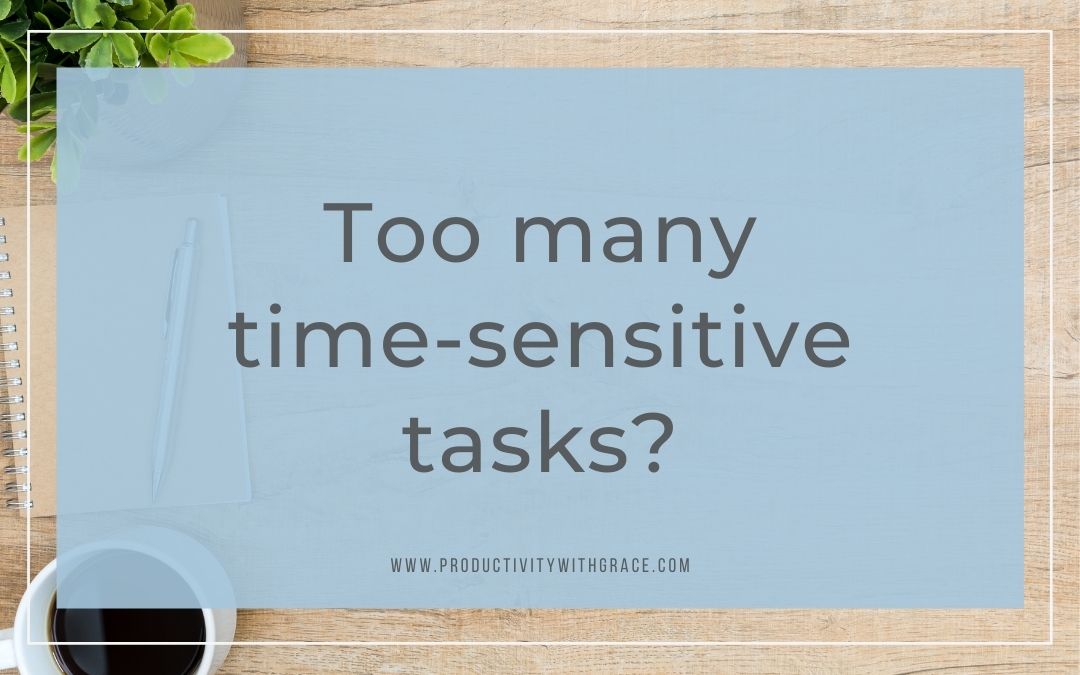I’ve definitely been guilty of having too many time-sensitive tasks on my to-do list sometimes. Well, more than sometimes. There’s a lot to do, so a lot makes it onto my to-do list. Only problem is, there’s just not enough time in the day to actually get everything done.
It’s tricky when time-sensitive things all seem to land on the same day. The end of the quarter is one example. Not only do you have accounting and financial tasks to get through, but in an ideal world you’re also reviewing your progress over the last quarter and planning out the next quarter. Add in client deadlines, other routine tasks, and personal life things like really needing to get to the grocery store, and suddenly there’s more on the list than you actually have time to accomplish.
Here are three quick principles you can use to get through these times. (Quick because I know you have more important things you need to get to.)
Principle #1: Plan ahead for time sensitive tasks
The more you can anticipate these times, the better you’ll be able to head them off.
Client deadlines falling on crunch day? Set yourself an internal deadline of a couple of days earlier so that you can take the time-sensitive task off your plate on the day you really won’t have time for it.
Busy day coinciding with your day for getting your newsletter out? Take some time during a less busy week to create a stash of newsletters you can dip into and send out when you really don’t have time to write something from scratch.
Get gas the day before, build up a stash of freezer meals you can thaw and reheat when you know you’d otherwise be ordering out, etc.
Of course, don’t just shift your busy day to another day by giving yourself a bunch of extra tasks. But push some things forward in your schedule if it makes sense.
Principle #2: Postpone what you can
Yes, you have deadlines, but not all deadlines are created equally. When you literally just do not have enough time to get to all of the time-sensitive tasks on your list, ask yourself which deadlines are a little fuzzier than others. And even seemingly hard deadlines like taxes have extensions you can file for.
That quarterly review you want to do on the last day of the month? It’ll be fine if you do it a few days late.
The term paper for your graduate school class? It’s not like your professor is going to be reading your paper right at the 11:59pm deadline. If you politely ask for an extension, you’ll probably get one.
Always publish your blog post or release your podcast episode on Mondays at 3pm on the dot? Some people might wonder if everything’s ok, but it’s not going to break your business to give yourself an extra day if you need it.
The key is “if you need it.” Don’t rely too much on postponing things. You don’t want to create an even worse bottleneck down the road because of the tasks you postponed. And you also don’t want to be falling into a habit of procrastinating on things you really do have the time and bandwidth for.
Principle #3: Delete or downgrade
Not everything on your to-do list needs to get done. Even if it has a deadline. There are things that you can just plain skip if you need to. And there are other things that you can do “good enough” without stressing about perfection.
Deleting doesn’t mean you’ll never do this thing ever again. It just means that it’s not important enough right now to be necessary.
Shipping items to customers who have ordered them? That’s necessary. Don’t delete it.
But that appointment you set with a friend to take some new headshots for your website? You can probably survive with your old headshots for a while longer.
Downgrading a task is a great way to make sure that a task still moves forward, but without taking up the time it would otherwise. It’s a great way to make sure you’re not letting perfectionism drive your schedule.
In my tutoring business, I like to write detailed lesson reports to parents after each session. For my students studying for the law school admissions test (the LSAT), I like to create detailed custom study plans after each session. When I’m busy, though, those lesson report emails get shorter. And the custom study plans start relying more on copy-and-paste from previous study plans from other students. The tasks still get done, but quicker.
Setting a timer for a task is a great way to force yourself to downgrade it. Doing part of the task is another. Perhaps you’ll publish that blog post, but only post about it on Instagram and skip Facebook or Pinterest for this week.
Showing yourself grace
A couple of final thoughts on these times when our time-sensitive tasks get out of control.
First, it happens to all of us. Don’t get too upset with yourself or start thinking that you’re somehow lazy or a failure for having a list that’s too big for the time available. Honestly, that’s just the reality of living in the 21st century.
Second, focus on getting through your current crunch time, and then put a system in place to prevent* the situation in the future.
*I say “prevent” but as I just mentioned, it’s pretty much an inevitable part of our lives. So what I really mean is “lessen the severity of the overwhelm” or “make it happen less often.”
Cultivate the habit of being picky about what you allow onto your schedule and saying no to everything else.

